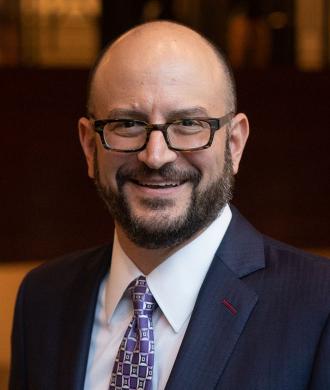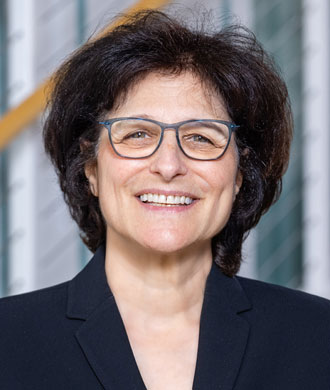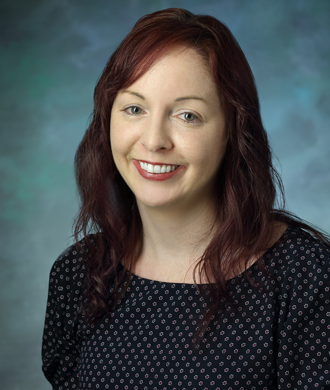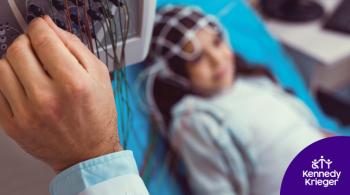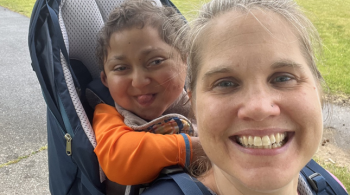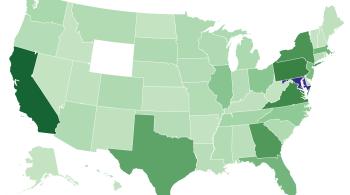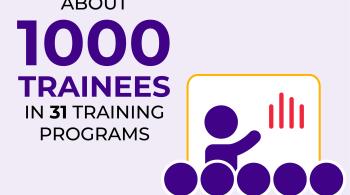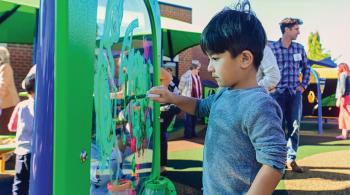Helping Parents Build Skills for Effective Parenting
Parenting is one of the most important jobs—but most parents don’t get formal training. Many rely on what they learned growing up and figure things out along the way. While that works for some, others may struggle—especially when faced with challenging behaviors or uncertainty about how to support their child. Join Dr. Brad Schlaggar, president and CEO of Kennedy Krieger, along with Dr. Debbie Gross and Amie Bettencourt, as they explore the Chicago Parent Program—a proven, innovative approach that helps parents build skills and support their children’s mental health and well-being.
Resources
- Website: Chicago Parent Program
- Email for more information: CpInfo@ChicagoParentProgram.org
Learn More About Our Host and Guests
Learn More About Our Host and Guests
View Episode Transcription
Dr. Brad Schlaggar (BS): Welcome to Your Child's Brain, a podcast series produced by Kennedy Krieger Institute with assistance from WYPR. I'm Dr. Brad Schlaggar, pediatric neurologist and president and CEO of Kennedy Krieger Institute. Parenting, for many, is among the most gratifying parts of the human experience. At the same time, parenting can, for a number of reasons, be very difficult. It's no surprise that there is a wealth of research showing that how parents raise their children, independent of other factors, contributes significantly to the social, emotional, cognitive and behavioral development of those children. In addition, factors like socioeconomic status, education, access to resources and others, also play major roles, not only in a child's development, but also influencing how parents parent. Even though parenting has such a substantial influence on a child's development, most parents do not get much training for it. Usually, they rely on what they have learned from their own parents and figure things out as they go. Many parents seem to manage just fine without formal help, but some may find it harder, especially if their child has challenging behaviors, or if they're not sure how to meet their child's needs. In those cases, there's a higher chance they might fall into less effective or even maladaptive parenting habits. Parents in need of additional support may seek formal parent training programs on their own, seek help from family and friends or could even be mandated to receive services by public social service agencies. So there are a variety of options, but not all parent training programs are equally effective or have been examined to determine their effectiveness. Today on this episode of Your Child's Brain, we'll hear about one program with demonstrable effectiveness in improving outcomes for parents, and that is the Chicago Parent Program. The Chicago Parent Program or CPP is a parenting skills intervention program focused on the parents of 2-8 year olds that was originally developed in 2002 at the Rush University College of Nursing in Chicago, Illinois. The Chicago Parent Program is rooted in the idea that to help a child, you must help the parent. The program was created in partnership between clinical faculty at the College of Nursing and a group of parents reflecting diverse neighborhoods in Chicago to address the parenting needs of families and under resourced urban communities. From its beginning, as an NIH funded project, CPP has grown into a nationally recognized program that has reached well over 15,000 families available in both English and Spanish. It's now implemented in schools, child mental health clinics, Head Start programs, primary care and community based organizations in at least 26 states across the US, and the program's results continuously demonstrate its lasting impact on outcomes. For over 10 years now, CPP has been headquartered here in Baltimore, Maryland, at the Johns Hopkins University School of Nursing. So why is this program eponymic for the Windy City now at home in Charm City? Well, we'll hear about how that happened from my guests today, Dr. Debbie Gross, the Leonard and Helen Stulman, Endowed Chair in Mental Health and Psychiatric Mursing at the Johns Hopkins School of Nursing. Dr. Gross was one of the co founders of the CPP when she was on the faculty at the Rush University College of Nursing. We will also hear from Dr. Amie Bettencourt, a clinical psychologist at Kennedy Krieger Institute's Center for Developmental Behavioral Health, who joined the CPP in 2014 when Dr. Gross brought the program to Baltimore and to Johns Hopkins. Dr. Bettencourt is an Associate Professor of Psychiatry and Behavioral Sciences at the Johns Hopkins University School of Medicine, with a joint appointment in both the Johns Hopkins School of Public Health and of Nursing. We're going to talk further about CPP, the benefits and the impact it's making on parents, children, and the communities it serves. Welcome Debbie and Amie. Debbie, in that intro, I describe briefly how the program started, but take us back to the early 2000s, what motivated you to create the program, what needs were you and your colleagues trying to address, and how did it all come together?
Dr. Debbie Gross (DG): Well, thank you so much for that introduction, Brad, we're so happy to be here. I am a child psych mental health nurse, and but first and foremost, I am a parent advocate. As you said, you cannot help children, especially young children without also helping their parents. But I also learned really early on that many of the best programs available to support parents were not actually designed to address the needs of families with lower incomes and limited access to resources. That's a problem. All parents want the same thing for their children. They want their children to be happy, healthy, do well in school, become responsible adults. But how you get there can be very dependent on the context in which you're raising your children. As a result, some parents who seek help may not feel heard, valued, or even understood because they're juggling a lot with limited resources and the programs are not geared towards their needs. We wanted to change that. Our team work with an advisory board of African, American, and Latino parents living in under-resourced communities in Chicago. They helped us to create a program that they would want to come to, one that would address their needs as parents in a way that valued their goals and their cultures. I thought that was really important. Then with grants from the NIH, as you noted, we were able to then test this program in several randomized trials because we wanted to make sure that the program would truly be effective for families. We found that not only did the programs lead to improvements in their children's behavior, which is what we really wanted, but that parents also appreciated how the program changed them and the confidence it gave them as parents, and that was so much of our goal.
BS: The emphasis on the community involvement in building the program. It's such an important principle. What are the components of the program?
DG: Well, as you noted, the CPP is designed for parents of young children 2-8 years old. While parents and children can struggle at any age, and they do, a lot of the difficulties start early. If those problems continue and grow, they can become entrenched and become much more difficult to change. Our goal has always been to start early. The program is very parent centric. A core aspect of the Chicago Parent Program is that parents are the experts about their children, and they are the change agents for their families. What does the parent believe is important? What are the behaviors they want to see changed? What are the strategies they believe would be most effective for the children? This is what guides the work of the program. We offer parents a range of strategies they can choose from, and then we help them to tailor those strategies to best achieve their goals. The strategies are all evidence-based, but not every strategy works for every child. Parents need a lot of tools in their tool belt and that's what we like to provide for them. The program first focuses on how to build and strength and positive relationships with your child before discussing strategies for setting effective limits. Now, a lot of parents sign up mainly for the second part. How do I get my child to behave? But what we've learned that for a lot of children, the frequency of misbehavior actually drops when parents give more of their attention to the child's good behavior. We really do focus a lot on that. CPP also uses a lot of different techniques for helping parents learn and gain insight. If parents learn by just reading a book, we could have fixed this problem years ago. We just hand out books everybody, but it's really much more complicated than that. One of the features of the Chicago Parent Program is the use of brief video vignettes. We have about 130 short videos of real families that we shadow with the camera for a half a day, and we got them managing in common, but sometimes challenging situations with their children. Sometimes parents in these videos are handling things really well. Sometimes things are not going so well for them. The idea behind the videos is to stimulate discussion and problem solving, not to model perfect parenting because there is no such thing. But sometimes we're asking parents to try something they've never seen before, or they've just never seen work before. The videos are really helpful for showing parents what a strategy might look like or why a strategy they've used might not have worked. We've also built practice activities into the session and between sessions because what we like to say is no one changes their behavior by just attending a meeting. You have to practice a new skill, see what works, what doesn't work. How can I tweak this thing to make it work better? That's how it becomes real, and it gets incorporated into everyday life. Those are the main components.
BS: It's clearly a rich and complex program, and you've touched on the main elements. Appreciate that. But maybe focus on, what are the elements of the program that make it different from other programs that make it stand apart?
DG: Well, I think the videos are definitely a unique feature. Parents can really relate to seeing other parents managing a situation that they also struggle with. Because the program was designed with parents, the program is also unique in the way it frames strategies for greater relevance. It doesn't feel like it's a program coming from some academics, and that's really important to us. I'll just give you one example. In one of our parent Advisory Board meetings, I brought up the topic of praising children for good behavior. Now, using praise is included in every parenting program, because it's an effective way to reinforce positive child behavior. It's a standard. But the parents in our Advisory Board were adamant. They did not praise their children. They believe that praise spoils children and that creates a lot of entitlement in children and many times they're right. They felt their job really was to toughen their child for a world that will never praise them. I get it, but also their kids are really losing out on a really potentially powerful tool for building strong sense of self. I asked the parents, 10 years from now, how do you want your children to feel deep down inside about themselves? They said things like, they want their children to feel strong, respected, smart, loved. All these things that all parents want for their children. I asked the parents, where are your children going to learn to feel that way? How are they going to develop that core sense of self, if not from you? When you see your child doing things that you really value, tell them something. Say, when you do that, it shows me you're smart. It shows me you respect yourself. It shows me how hard you're working. That just changed the conversation entirely. It just totally reframe for parents how they thought about praise, and that's how we address the strategy in the program. That's the opening question of that session. We actually have group leaders to say is one of their favorite sessions because no one's ever asked parents. What is it they really value for their children? It's just really become a very powerful tool for helping them build strong children, which is what parents want.
BS: Well, how would you describe the benefits of the program? In particular, how you see the program changing the trajectory of early childhood development for a specific child, for example?
DG: Well, our data shows that CPP leads to significant improvements in parenting confidence and skill and significant reductions that are sustained in children's behavior problems. What happens is you see a drop not only in children's behavior problems that are upsetting to parents, but also difficult for teachers to manage in the classroom. But that these changes have been shown to be sustained over time, so they're not just short term and gone. But some of the most compelling outcomes we've heard are the ones that parents share anecdotally with us, how the strategies they learn changed their whole family. Because we're starting early, many of the benefits can really be seen pretty quickly because you're not undoing so much. One of the benefits, in fact, of providing programs for parents is that the strategies they learn can be generalized to all of their children. We've had parents say that a particular strategy work well with their four year old, but they were amazed how well it also helped their 12 year old. We've had agency leaders who tell us that because a lot of our work is really training is helping providers in those agencies to support parents that they serve. What happens when you train the agency staff is it changes the way they also deal with the parents. Not only that, but the parents say that the programs make them feel valued by the agency. It really has benefits at multiple levels for the child, for the parent, as well as it builds community and social connection, and I think those are all important.
BS: This podcast, we've talked multiple times over the many episodes now 50, actually.
DG: Wow, congratulations.
BS: We've talked about adverse childhood experiences or ACEs on multiple occasions and how those ACEs impact negatively, a child's developing brain. Of course, in many situations, it may also be the parents own history of ACEs that can hinder potentially their parenting ability. How do you incorporate that construct and the work that you do with parents?
DG: It's such a great question, Brad. Thank you. I really do think the Chicago Parent Program is particularly impactful for parents who've experienced adversity growing up because they want to create a different future for their children. It's a program that was designed to be non stigmatizing. It's been used in a lot of schools in Baltimore City, and so we did a study, we partnered with the Fund for Educational Excellence to do a study, by the way, the fund for Educational Excellence is, a community organization in Baltimore City that coordinates a lot of the Chicago Parent Program groups. They call it CHIP in Baltimore City Schools. We did a study of asking parents who were volunteering to enroll in one of, I think they were like 38 groups, actually, I think at Baltimore City Schools, and asked them to complete a measure of ACEs. These are parents who just volunteered to be in this program. They had a child who was either in pre K up through second grade. Turns out about 60% of the parents attending the program reported directly witnessing violence growing up, which, by the way, is defined on the survey as seeing or hearing someone being beaten up, stabbed or shot in real life. Nearly half also reported being physically or emotionally abused as children. Many also reported growing up in homes where there was substance use and mental illness and sexual abuse. There was a lot of adversity among the parents who were volunteering to be in this program to learn how to do it differently. I have to say the participation rates were quite high. The average participation rates coming to three quarters of the sessions because parents wanted to learn new and better ways to build a positive relationship with their child. They also wanted to learn how to set clear limits, but without losing control. The lesson to us was that if programs like Chicago Parent Program are offered in convenient settings in a non stigmatizing way, parents will come and they will do really well and it can change their lives and their children's lives.
BS: Amie. I mentioned at the Intro that you joined in the Chicago Parent Program, it's just over 10 years ago now. Can you tell us about how you came to learn about the program and how did you become involved?
Dr. Amie Bettencort (AB): Sure. Happy to. I met Debbie in 2013. I at the time was working in Baltimore City Schools in the research office, and so I would talk to a number of different researchers who were interested in doing research in the schools. Debbie came. She did a presentation to our team about the Chicago Parent program, and then wanted to have some follow-up conversation about doing a project in the schools. When we got to talking about it, I got very excited about the initiative, and I asked how I could get involved. That conversation, as well as some others that were had around funding sources, etc., was really the beginning of what would become the first iteration of the CHIP Project that Debbie mentioned. I ended up serving as the project director for the CHIP Project, and that was the first study involving implementing CPP in Baltimore City Public School Pre-K programs and 12 of those programs over a period of three years. We've really continued that partnership ever since.
BS: This is audio only, but I can see you both, and I can see Debbie's smile. I think remembering probably that moment, the realization that she found a partner in this program, which is great. Tell us more about that research that you implemented around CHIP.
AB: Sure. I'll talk first about CHIP, and then there's a couple other projects we're doing more recently that I want to mention as well. The CHIP Project really involved partnering with the Fund for Educational Excellence, which Debbie mentioned, and I was based there as the project director, as well as 12 Baltimore City Public schools with full day Pre-K programs. We trained their school staff to implement the program, and we monitored and evaluated that implementation over a three-year period. We used small financial incentives to encourage attending the groups and completing weekly practice assignments, which Debbie has alluded to, practice is super important, a core component of CPP. In that study, we achieved the best attendance rates we have ever had. Seventy-nine percent of parents who enrolled attended one or more sessions, and among those who came, the average attendance was eight out of 12 group sessions, very high. We also observed high parent satisfaction rates and a significant drop in the number of children with behavior problems in the clinical range by post-intervention. The program was so well received that a community organization that I already mentioned, the Fund, has continued since then to partner with city schools to operate the program and has expanded it to more schools. There's been additional research that we've done, and Debbie alluded to that in talking about ACEs. But the program has also just continued simply as a program implementation outside of a research project, partially funded by Title I funds at other public sources of dollars as well as private funding, because the schools really recognize its value. That has really heartened us to continue our research on the program as well. More recently, Debbie and I have collaborated on several projects to develop, implement, and evaluate an individualized version of the Chicago Parent program, which is designed to be implemented by clinicians one-on-one with families. The first of those two studies that we've done on what we call CPPI, was conducted at four child mental health clinics, including the Kennedy Krieger Center for Developmental Behavioral Health, and we've since continued our development work on this CPPI, and are in the midst of a study examining its implementation by nurses and in collaboration with Head Start, and we're really excited to see where that's going to lead us.
BS: When you think about the effectiveness of the program, one of the ways it can manifest because of such a critical role that parents have in implementation of medical or mental health treatment, how do you see the way the program impacts the implementation of the treatment for children?
AB: That is a really important question. In the mental health field, we often really think about treatment as being directly with the child. Maybe that goes back to Freud. I'm not sure who that goes back to, but we've always really thought about that as this conversation directly with the child. But for young children in particular, but also for other specific mental health concerns which I'll talk about, parent training or behavior management training working directly with the parent, is really the first line treatment for children under the age of six presenting to mental health clinics with mental health concerns, a whole range of concerns. For children above age six with ADHD or a disruptive behavior disorder, it is still the recommended treatment, along with medication, in some cases, as in with ADHD. It's so important not only to have the parent involved in that care, but really that they're seen as the change agent for their child, and so the intervention really is with them rather than with the child directly.
BS: It follows also that the clinician would benefit from being trained up in how to think about the role that parents must have in the implementation of treatment, can you loop us back to the interaction with the clinician in your research as well?
AB: Sure. I'll first just say that myself as a clinician, that it really changed me to be trained in parent training programs and the Chicago Parent program in particular, because I was so oriented to, and we're going to do cognitive behavioral therapy. We're going to work with the child. The parent will help us in thinking about how to implement whatever practice assignment we're asking. But I was really thinking about that this work is with the child directly. I think now, it is more common practice in the training of new clinicians to have parent management training or behavioral parent training, it's got lots of different names, to be part of their core training. But I do think for those of us who've been in the field longer, it's been more of a paradigm shift. We do provide training in both our group-based model and in our individual model for a whole range of implementers, but clinicians is one of those groups. I do see that it can change the way clinicians practice even outside of delivering parent training directly.
BS: Debbie, what other ways has the program evolved over the decades since you and your colleagues created it? Has the focus shifted, or have the approaches to the focus areas shifted?
DG: It's a great question. We've grown a lot. Even from the very beginning, I think an ethic of the way we work is that we're always responding to the needs of the community, of parents, and providers and clinicians. While the program started out as a very manualized group-based program for parents, mainly for prevention in early childhood and school settings, and we still do that, but we've also learned a lot about that CPP is very effective in traditional child mental healthcare settings and at lower cost, by the way, than other programs. We've really expanded our footprint in traditional child mental health settings, which by the way, is very important in my opinion, because as I think Amie alluded to, too few clinicians are comfortable working with young children, and yet that is such an important group that we have to be responsive to. We've really tried to expand our connection in child mental health settings. We've also, as Amie mentioned, we've adapted CPP for individual families because we realize that groups provide a lot of benefits in terms of the social connection and the learning from one another, but they also present logistic issues be it for an agency, but also some parents can't attend at the time that the group is offered, whereas individualized version provide a lot more flexibility. We also have a web-based version, the Chicago Parent program that can be combined with individual coaching. The program is constantly evolving to deliver in a way that best meets the needs of families and agencies, but always staying true to the core components, that parents are the experts, using the videos and the practice, all the things that we already talked about. Those are core to every one of our adaptations. There's actually a group in Cincinnati that has been funded to adapt the program for foster families. We're constantly looking for ways to really make it work for parents who need it.
BS: Amie, one of the things that I know it is an area of your focus and touched on is disruptive behaviors in children. What are some of the risk factors that are associated with the development of those behaviors? How can they be prevented and treated?
AB: Great question. There really are a range of factors that can contribute to the development of disruptive behavior in children. I'm going to focus primarily on young children, but there are risk factors that pop up along the developmental trajectory. Some that come to mind include early emotional and behavioral regulation difficulties, early exposures to violence and other adverse childhood experiences and traumatic events, developmental delays and language disorders. For example, we forget that a child with a speech delay might be frustrated because they're having trouble communicating, and that's going to display as disruptive behavior rather than just that they're trying however they can to get their needs met. We also see children who are struggling with anxiety, have disruptive behavior problems, and not getting enough sleep. I don't know about you, but if I don't get enough sleep, I'm cranky. You can imagine in a young child, that crankiness might manifest as disruptive behavior. There's also some things that we think about in the adults around the children. Inconsistent or overly harsh parenting can also be contributors to disruptive behaviors in children. We know that disruptive behaviors in children, particularly young children, as we've really been echoing throughout this discussion, are best treated through an approach that works with the parent directly. Parent management training really supports parents in being the change agents for their children's behavior by changing their own behaviors, such as giving more attention to the behaviors they want to see more of, and less attention to those misbehaviors, as well as strategies for setting limits on misbehaviors.
BS: Amie, here we are several years now beyond what some consider the outer bounds of the pandemic itself, but we're still feeling the impacts of it. I'm wondering, looking back on the pandemic and this post-pandemic period, how has the program been impacted by the myriad of external stressors that came due to the pandemic and this period that followed?
AB: Great question, and I still struggle with how far are we in this post-pandemic period and whether we can still say that. The pandemic certainly created a lot of challenges for families. I think the most obvious ones that we think about and that we soft families go through was they were wearing many more hats because they were managing their child's everyday needs as they normally would, but they were also then providing their formal educational needs. There was no Head Start program or no Pre-K programs to be attending because everything was shut down or moved online. That certainly was a major switch for parents. Parents were also more isolated from their support networks and parents stress levels really increased. Children also didn't have opportunities for socialization outside of the family, which also meant they weren't necessarily learning the same types of routines that they might be learning developmentally at that point. In many cases, families face additional hardships such as job loss and increased food insecurity. Just generally stress levels were significantly increasing. The pandemic did something for us unexpected, I think. It really forced us to pivot in order to offer groups virtually, which is not something we had done prior to that. This ended up being a very good thing, because we were able to reach many more families and to provide a platform for promoting social connectedness among families who were isolated because of the pandemic. I was offering CPP groups in the Kennedy Krieger Center for Development and Behavioral Health at the time, and a move to virtual really allowed us to reach more families in remote areas of Maryland where it could not have been feasible for families to travel multiple hours to attend the groups at our center. Attendance in our virtual groups was so strong. Really, this pretty significant and stressful event also pushed our program in a really helpful way, I guess a benefit that came out of it.
BS: Debbie, I want to end with a question that gets us back to talking about outcomes. As we've said a couple of times, now, this is an evidence-based program with demonstrable effectiveness. I think we could leave on that recounting and elaborating on some of those outcomes that have been demonstrated, both early on in the program, and also sustaining now 20 plus years into it.
DG: Well, if you think about the most core thing we're trying to change, we're trying to improve is children's behavior from both the perspective of parents and teachers, because if they're having a hard time sitting still in school is hard to learn. We also look at changes in parenting behavior because we want to make sure they're using the skill. We do know that if parents are not using the new strategies, you're not going to see the changes in the children's behavior. We're also looking at parents' confidence, which is very important because when parents lose their confidence, their grasp is stress. They become inconsistent, they become very stressed, and they don't feel good about themselves. The whole point of this is to have parents not only have a tool belt of strategies they can use, but to feel good about what they're doing and understand why they're doing it. The other is that we're trying to make a difference for agencies too. Increasingly, we've been expanding beyond the immediate family and trying to look at the extent to which, are we making a difference for the agencies? We're looking now at parent engagement in children's education. I've had folks tell me that the reason that the school has invested in doing the Chicago Parent Program in the school is because, as he said, it changes the culture of the school. Parents feel valued. Teachers feel like parents are more connected with them. They share information. We're starting to look increasingly at parent engagement and relationships in schools. Then, of course, we're looking at the relationship among parents because so much of what parents struggle with, especially since COVID, is the social isolation that has occurred. Parents are very insulated from one another, and the social connection that happens even in the groups has been so powerful, and is significantly related to the magnitude of the change in their children's behavior. We're looking at a micro level, and then much more at a community level.
BS: Debbie, how can people get more information about the program?
DG: First of all, you can learn more about going to the website chicagoparentprogram.org, but we also would love to hear from you. If you want to email us at CppInfo@ChicagoParentProgram.org, we'd be happy to hear from you too. Always connect. We'd love to be connected with you.
BS: We'll provide resources that you all provide to us. We'll put them on a web page associated with this episode, and that's an excellent place to end. Thank you to our guests, Dr. Debbie Gross and Amie Bettencourt. We hope that you our listeners have found this discussion interesting and informative. Please check out our entire library of topics on your Child's Brain at wypr.org, kennedykrieger.org/ycd or wherever you get your podcasts. You've been listening to your Child's Brain. Your Child's Brain is produced by Kennedy Krieger Institute, with assistance from WYPR and producer Mark Gunnery. Please join us next time as we examine the mysteries of your child's brain.

